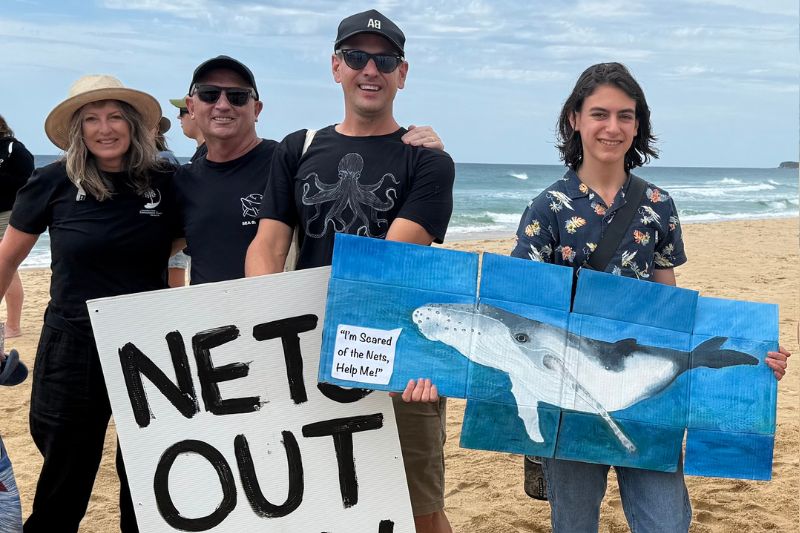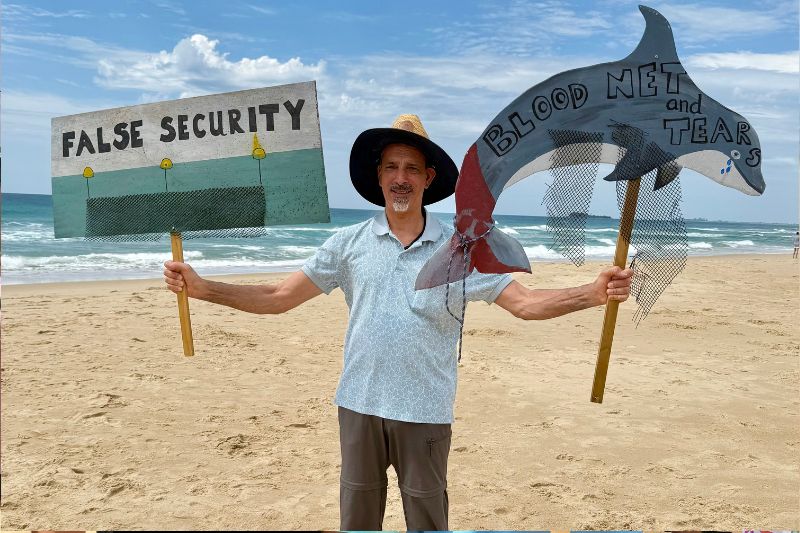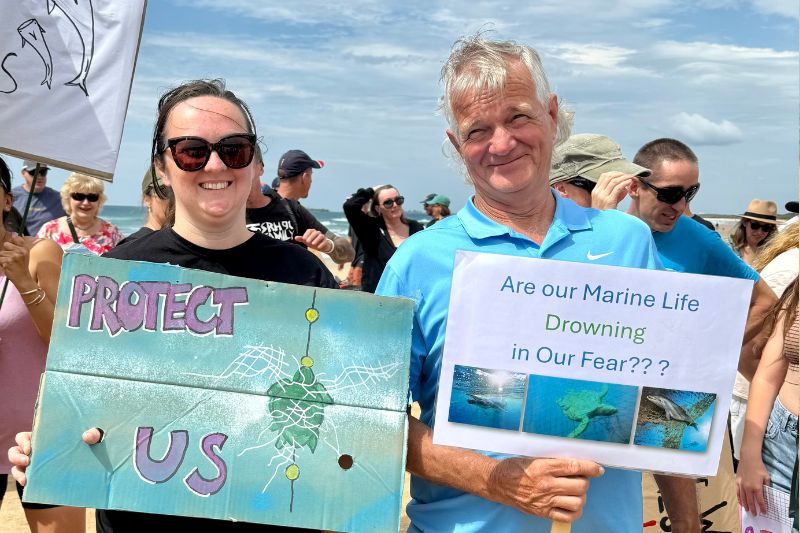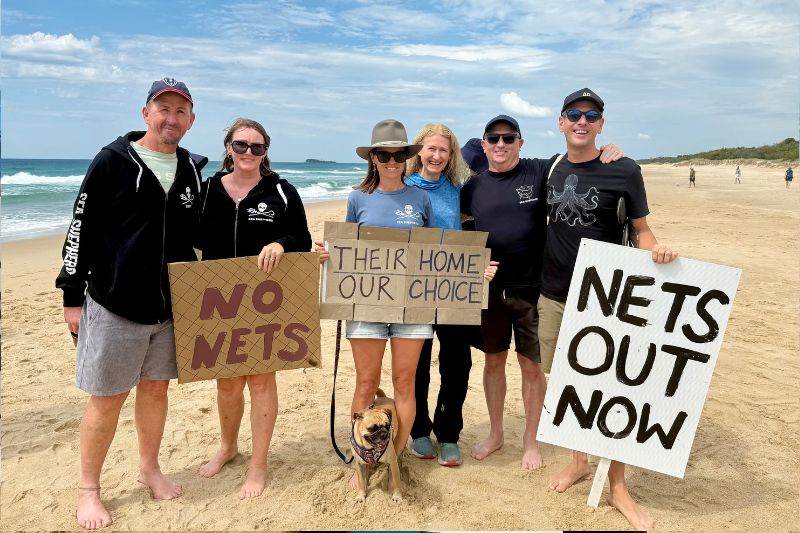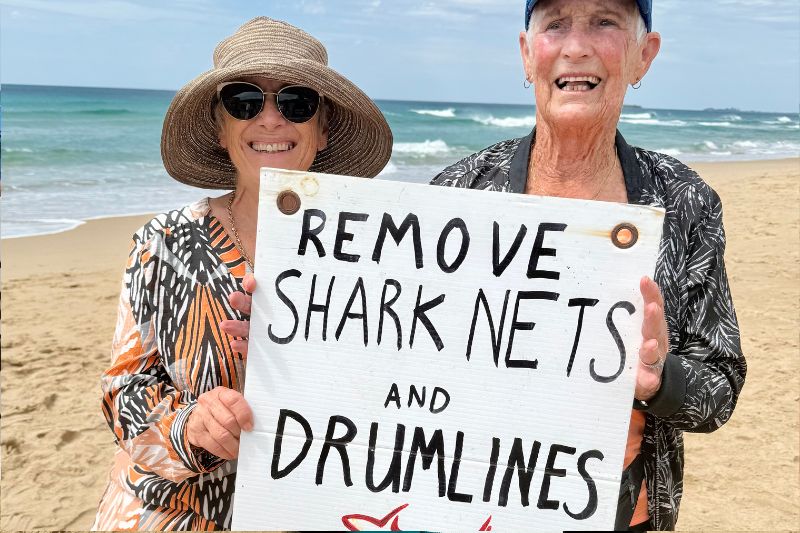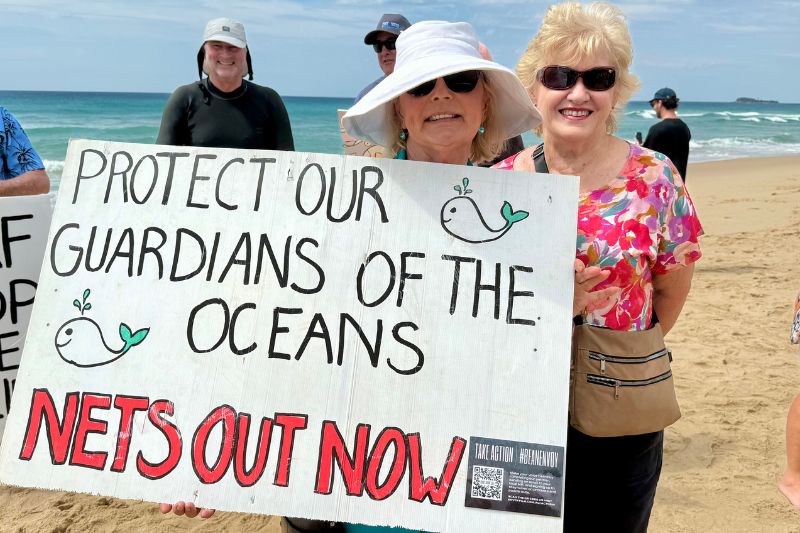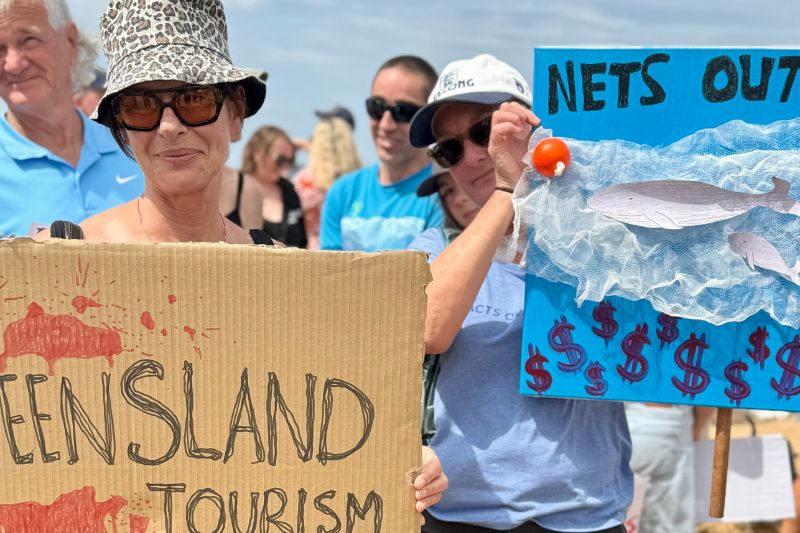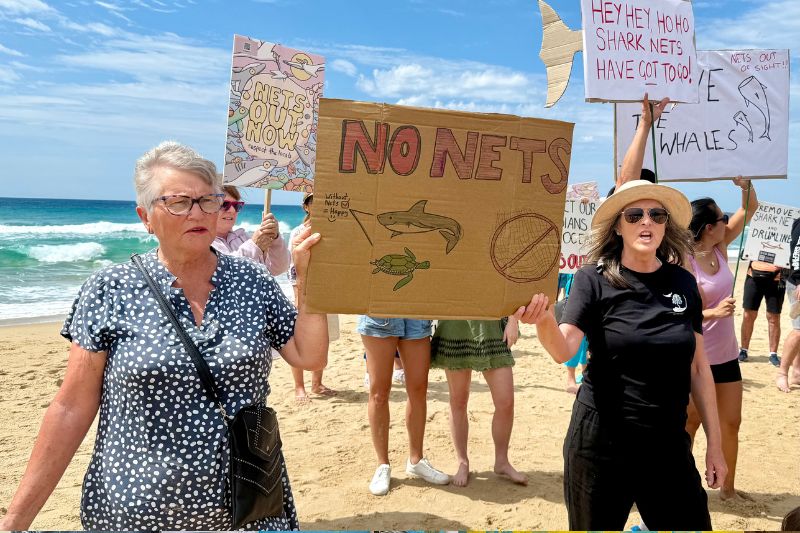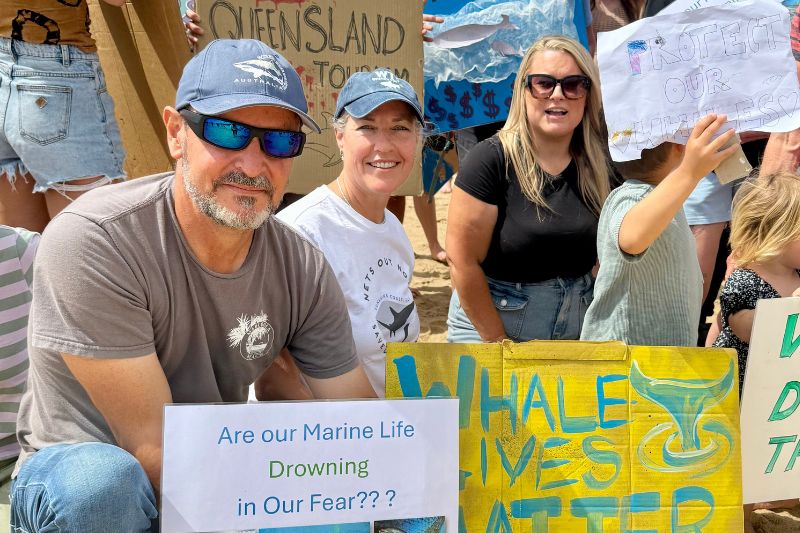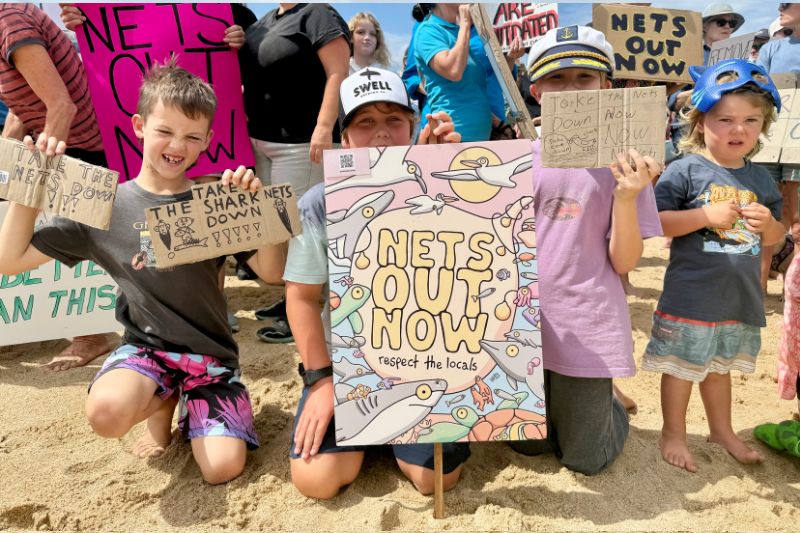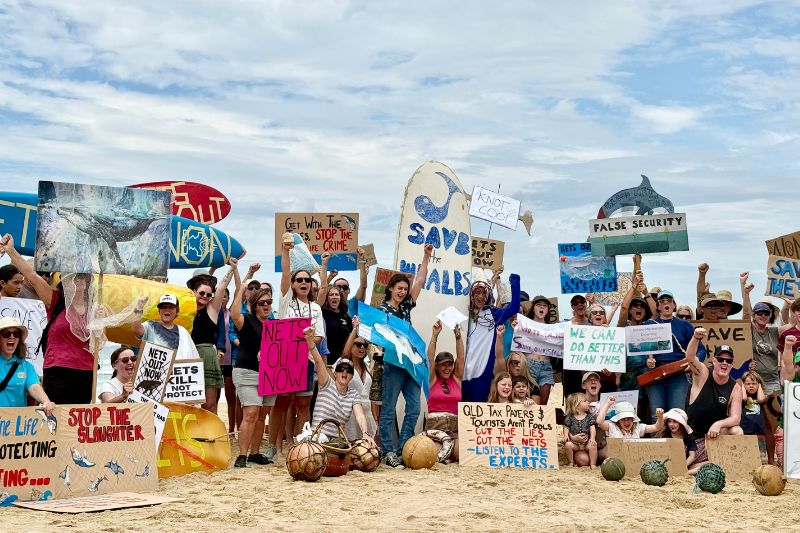Conservationists asking for shark nets to be removed during whale migration months
VANESSA HALL
Editor
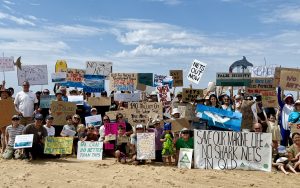
A SWIFT call to action was organised on Saturday, September 20, in response to recent whale entanglements in shark netting off the coast at Noosa and Marcoola, with the concerned community members asking the State Government to remove shark nets during whale migration months.
On Wednesday, September 17, a mother and calf were entangled off Noosa, and a late-night release was successful. On Friday morning, another baby whale was entangled off Marcoola, and that whale was also freed later in the morning.
The recent entanglements have highlighted arguments from conservationists who state that Queensland should follow the same practice as NSW, who remove its nets during whale migration months. Removal of shark nets during this period is also a recommendation from an independent report commissioned to evaluate the Queensland Shark Control Program and provide recommendations.
Local Councillors from both Noosa and Sunshine Coast Council, as well as independent Noosa MP Sandy Bolton, also agree with the removal of shark netting during whale migration months, with Ms Bolton instrumental in the swift release on Wednesday night.
“We were advised that a contractor was en route to assess whether a safe rescue was possible on the night. They arrived at 9:20 pm, with successful release of the whales by 11 pm through the assistance of locals on site,” Ms Bolton said.
The Noosa MP followed up the next day with the Minister for Primary Industries, Tony Perrett and said she will continue to advocate on the matter, asking for the trialled replacement of shark nets with alternatives during whale migration months.
“The independent review of the Shark Control Program by KPMG states efforts to minimise negative impacts on marine ecosystems are not currently achieved by the program and recommends the trialling of the removal of shark nets during the winter whale migration seasons.”
Similar statements were made by both Councillor Taylor Bunnag and Maria Suarez from Sunshine Coast Council, with Cr Suarez acknowledging that the program falls under the jurisdiction of the State Government.
“I and other Councillors have raised questions about their existing use, what impact it is having on marine species and their effectiveness. It has been difficult to get the data, especially regarding the quantity and species of marine animals inadvertently injured or killed in the nets, from the State departments.
“As there is definitely increasing community sentiment to transition to modern, non-lethal alternatives to managing swimmer safety at our beaches, I will undertake to work on advocacy actions on this topic,” Cr Suarez said.
CONSERVATIONISTS SPEAK OUT
Envoy Foundation Founder Andre Borell, who has been working in the field for some time and directed a film for Netflix on the topic, said that more needs to be done.
“Images such as what we saw this week are harming the reputation of Queensland, and the bare minimum should be to do what NSW is doing, which is to remove the shark nets during whale migration months.”
Mr Borell said that there was also not enough information on how freed whales fare after a release.
“Whales are highly migratory, and they only feed in Antarctica. When they are entangled, it is a very stressful event where they use up a lot of energy, and we have no data on how well they survive once they are released and if they do make it back to Antarctica.
“It’s great to celebrate a release; however, we shouldn’t have them entangled in the first instance.”
THE CASE FOR NETS
Online comments from shared posts from the two whale entanglements were mostly in favour of the removal of shark nets; however, those who were for the nets to remain cited swimmer safety as the main priority, which is the message from the State Government as to why they continue to use them.
Minister for Primary Industries Tony Perrett responded by stating that the Crisafulli Government makes “no apology to prioritise the safety of people above all else.”
“Until the new technology is as effective at protecting beach goers as the old, we will continue to invest in what keeps Queenslanders and our beaches safe.
“Unlike our southern neighbours, our beaches remain hugely popular throughout winter, and we won’t compromise on swimmer safety.”
Minister Perrett’s office also highlighted statistics to back up the cause of action from the State Government, stating that approximately 45 thousand whales will migrate past Queensland’s coast this year and that, on average, fewer than six become entangled in nets or drumlines.
Despite these figures, shark nets and drumlines are responsible for other marine life becoming entangled, with the KPMG report stating that in NSW during the 2023-24 period, nets caught 13 Green Turtles, 11 Leatherback Turtles, and five Indo-Pacific Bottlenose Dolphins. These incidents led to a review of their program… and the removal of shark nets one month earlier in April, to accommodate heightened turtle activity.
Noosa Mayor Frank Wilkie also commented on the events of the week and furthered the call for action needed in regard to removing nets.
Cr Wilkie said Council supports the Shark control program; however, these incidents reinforced the need for the State Government to consider a trial of removing the mesh nets during the winter migrating season.
“Council endorsed a Mayoral Minute in July this year, requesting the State trial removing the mesh nets for the shark control program and use other non-lethal measures,
“These were recommendations from a review conducted by KPMG for the Department of Agriculture and Fisheries, so we urge the State Government to implement the recommendations,” Cr Wilkie said.
NETS & RECOMMENDATIONS
Mesh Nets are typically 186 metres long and six metres deep. They are deployed parallel to the shore and anchored to the seabed, with floats maintaining them in a surface-set position.
Mesh Nets do not create a complete barrier, allowing sharks and other marine life to swim around or under them, but function by entangling animals that come into contact with them.
When a shark or other marine animal is caught in the net, it is typically found and dealt with during checks by shark control program contractors, where target sharks are euthanised if not already dead, and non-target species are released if still alive.
All nets are modified with three dolphin pingers and four whale pingers in an effort to reduce entanglement with these species.
The KPMG report states that removing mesh nets during the whale migration season reduces the environmental impact of operations by preventing whales from becoming entangled in SCP nets. This measure will not only improve the safety of staff who undertake dangerous rescue operations to release entangled marine animals but will also mitigate negative media attention and boost community sentiment.
What do you think about shark nets? Why not send in a letter to the editor and tell us your thoughts – editor@coolumadvertiser.com.au

